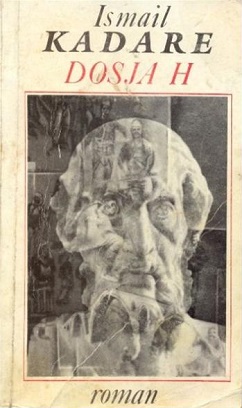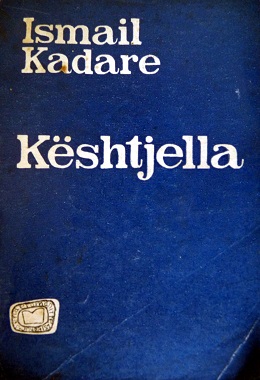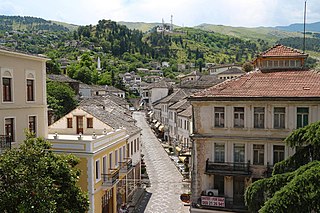
Albanian culture or the culture of Albanians is a term that embodies the artistic, culinary, literary, musical, political and social elements that are representative of ethnic Albanians, which implies not just Albanians of the country of Albania but also Albanians of Kosovo, North Macedonia and Montenegro, where ethnic Albanians are a native population. Albanian culture has been considerably shaped by the geography and history of Albania, Kosovo, parts of Montenegro, parts of North Macedonia, and parts of Northern Greece, traditional homeland of Albanians. It grew from that of the Paleo-Balkan cultures, including Proto-Albanian, Illyrian, Thracian, Dacian, with their pagan beliefs and specific way of life in the wooded areas of far Southern Europe. Albanian culture has also been influenced by the Ancient Greeks, Romans, Byzantines and Ottomans.

Ismail Kadare is an Albanian novelist, poet, essayist, screenwriter, and playwright. He is a leading international literary figure and intellectual. He focused on poetry until the publication of his first novel, The General of the Dead Army, which made him famous internationally.
Albanian literature stretches back to the Middle Ages and comprises those literary texts and works written in Albanian. It may also refer to literature written by Albanians in Albania, Kosovo and the Albanian diaspora particularly in Italy. Albanian occupies an independent branch within the Indo-European family and does not have any other closely related language. The origin of Albanian is not entirely known, but it may be a successor of the ancient Illyrian language.

The File on H. is a novel by the Albanian author Ismail Kadare. It was first published in Albanian in 1981 under the title Dosja H. Jusuf Vrioni translated the work to French in 1989 as Le Dossier H. David Bellos translated the French version into English in 1996. Both Kadare and Bellos have received praise in the English speaking world for the edition.
David Bellos is a British academic, translator and biographer. He is the Meredith Howland Pyne professor of French and comparative literature at Princeton University in the United States, and was director of its translation and intercultural communication programme from 2007 to 2019.
Arcade Publishing is an imprint of the American book publisher Skyhorse. Founded in 1988 by Richard Seaver and his wife Jeannette, it was originally an independent company publishing trade fiction and nonfiction. After declaring bankruptcy following Richard's death in 2009, Arcade was acquired by Skyhorse Publishing in 2010 and relaunched the following year.

Broken April is a novel by Albanian author Ismail Kadare. Published in 1978, the book explores one of Kadare's recurring themes: how the past affects the present. The novel concerns the centuries-old tradition of hospitality, blood feuds, and revenge killing in the highlands of north Albania in the 1930s. It was translated into English by John Hodgson for New Amsterdam Books in 1990.
Bilal Xhaferi, often referred to as Bilal Xhaferri, was an Albanian writer and political dissident against the Albanian communist regime. He is seen as the representative poet of the Albanian Chameria.

The General of the Dead Army is a 1963 novel by the Albanian writer Ismail Kadare. It is the author's most critically acclaimed novel. Kadare was encouraged to write the book by Drago Siliqi, literary critic and director of the state-owned publishing house Naim Frashëri. It was first published when the writer was 26 years old.

The Siege is a historical novel by Albanian author Ismail Kadare, first published in 1970 in Tirana as Kështjella. It concerns the siege of an unnamed Albanian fortress by troops of the Ottoman Empire during the time of Skanderbeg, loosely based on the historical Siege of Krujë (1450). It was translated into French by Jusuf Vrioni and then from French into English by David Bellos. The novel was partly rewritten by Kadare after he moved from Albania to France in 1990; most of the changes were references to the Christian beliefs of the Albanian garrison, which had been cut from the original version by the communist censors.

The Stone Bridge is located in Vushtrri, Kosovo. It dates from the end of the 14th or early 15th century, and, according to popular legend, was built by the brothers Vojinović, mentioned in Serbian epic poetry as nephews of Tsar Dušan. It carried over the Sitnica river the trade route between Dubrovnik and Skopje and neighbouring parts of the Balkan Peninsula.

Princess Argjiro or Argyro is a legendary figure in Albanian and Greek mythology. She is supposed to have lived in the 15th century.

Doruntine or Who brought Dorontine is a novel by Albanian writer Ismail Kadare. It is based on the old Albanian legend of Constantin and Doruntine.

Gjirokastër is a city in southern Albania and the seat of Gjirokastër County and Gjirokastër Municipality. It is located in a valley between the Gjerë mountains and the Drino, at 300 metres above sea level. Its old town is a UNESCO World Heritage Site, described as "a rare example of a well-preserved Ottoman town, built by farmers of large estate". The city is overlooked by Gjirokastër Fortress, where the Gjirokastër National Folklore Festival is held every five years. It is the birthplace of former Albanian communist leader Enver Hoxha, and author Ismail Kadare.

Elegy for Kosovo is an Albanian novel written by Ismail Kadare.

The Palace of Dreams is a 1981 novel by the Albanian writer Ismail Kadare. Set ostensibly in the Ottoman Empire, but in a deliberately imprecise past shaded by myth and intended to represent the modern totalitarian state, The Palace of Dreams follows the rapid rise of Mark-Alem, a young Ottoman Albanian related to the powerful Köprülü family, within the bureaucratic regime of the title palace, a shady ministry whose objective is to gather, examine and interpret the dreams of the empire's subjects in order to uncover the master-dreams, which are believed to shell the future destiny of the Sultan and the state.

The Successor is a 2003 novel by the Albanian writer and inaugural International Man Booker Prize winner Ismail Kadare. It is the second part of a diptych of which the first part is the novella Agamemnon's Daughter. The diptych is ranked by many critics among the author's greatest works.

Twilight of the Eastern Gods is a novel by the Albanian author Ismail Kadare. It was published in installments in Albania between 1962 and 1978, and published in full in 1981 in the French translation of Jusuf Vrioni. The English translation by David Bellos, published in 2014, was made from Vrioni's French.

The Traitor's Niche is a historical novel by the Albanian author Ismail Kadare. It was first published in Tirana, Albania in 1978. The English translation by John Hodgson was published in 2017. It is part of a loose trilogy that includes The Three-Arched Bridge and The Palace of Dreams.
















